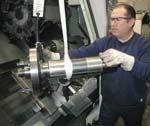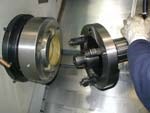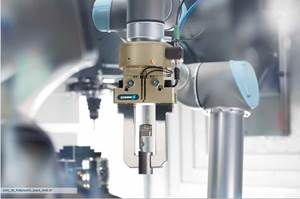Quick Change Workholding For Hard-To-Hold Parts
This pwer chuck features direct transmission of the piston force to the jaws in the area of the jaw guides. The axial actuating force is transmitted to the jaws without major friction loss.
Share




Bryn Van Hiel, owner of Technicast Corporation (South Gate, California), was looking to expand and extend his machine shop's job capabilities. After finding a CNC machine that could handle his machining requirements, a Mori Seiki 2l-3, Mr. Van Hiel found he needed something "extra" when it came to his workholding needs. To meet these "extra" workholding needs, he decided to try the Rohm KFD-HS-type power chuck from Rohm Products of America.
The KFD-HS features direct transmission of the piston force to the jaws in the area of the jaw guides. The axial actuating force is transmitted to the jaws without major friction loss. Other features include low component count; long jaw ways; large bore; universal design of wedge connection (even in the fully retracted position, the wedge neck will not project into the spindle bore area); and short taper mounting. The 15-inch chuck is flexible enough to be used on other machines in his shop, and the special wedge-type design creates reliable, close tolerance repeatability. Additionally, the high speed chuck features a high gripping force. With long, extended adapter plates added to the machine spindle, the chuck allows Mr. Van Hiel to work with 6.5-inch bar stock on all his machines.
Mr. Van Hiel approached Rohm with a request for flexible workholding for both outer diameter (OD) and inner diameter (ID) and clamping with a minimum changeover time. The clamping diameter range he indicated ranged from 3.5 inches to 6 inches ID and 2 inches to 12 inches OD. Jürgen Schleicher, general manager of Rohm Products, said that covering this range would not be a problem for the KFD-HS 15-inch chuck—that is, until Mr. Van Hiel showed him drawings of the workpieces that were to be clamped on the inside diameter.
The workpieces were very thin-walled sleeves, most of them made from exotic brass material and many of them 15 inches to 20 inches long with a ¼-inch wall. Mr. Schleicher found that the only way to accurately hold these sleeves (while machining them to a very tight tolerance) was to design a special mandrel where many different sizes of expanding sleeves and actuating arbors could be changed quickly.
Rohm agreed to come up with a method to "quick change" the 15-inch KFD-HS power chuck with a specially-designed mandrel, including a 12-inch flange and 25-inch length, for clamping the thin-walled sleeves. Both items had to be exchanged on the A2 11-inch Mori Seiki spindle within minutes. Gerard Cochard, Rohm Products vice president of sales and an experienced designer, concurred that Rohm could meet those requirements.
"We can do it this way and hold the accuracy and repeatability of both the chuck and mandrel—exchanged within 0.0001-inch—without any adjustment. That's what the RMS system is designed for," Mr. Schleicher told Mr. Van Hiel.
Because they would be changing components from short taper to short taper, they found that they would not lose any tolerance. According to Mr. Schleicher, with the KFD-HS power chuck's high precision quality, the concept of changing a large range of ground sleeves on the mandrel was realized much easier than Rohm expected.
Rohm provided a basic receiver that was mounted to the A2 11-inch Mori Seiki spindle. This receiver included a bayonet system, which locks the workpiece into position via special cup springs. The power operation was accomplished via a Rohm non-through-hole, hydraulically-operated cylinder that actuates the drawbar with a collet at the end. The collet closes on the retention knob of the chuck or mandrel and opens or closes the chuck jaws or the mandrel sleeves. The collet also releases the workholding retention knob when in the "open" position. The operator has only to turn the mounting bolts (bayonet system) 90 degrees, and the chuck or mandrel can be changed within minutes. The former changeover time of approximately 1 ½ hours was reduced to less than 5 minutes. According to Mr. Schleicher, the accuracy and repeatability has been outstanding for many months now and has convinced even the Technicast CNC operators, who were worried about how long it could last.
Related Content
Using Automation to Reduce COGS and Stay Globally Competitive
Decade-long, multiphase automation investments lower operating costs and maintain technology lead in an increasingly competitive global market.
Read MoreCustom Workholding Shaves Days From Medical Part Setup Times
Custom workholding enabled Resolve Surgical Technologies to place all sizes of one trauma part onto a single machine — and cut days from the setup times.
Read MoreNavigating Large-Scale CNC Machining: Suburban Tool’s Niche Strategy to Stay Competitive
Facing increasing competition from lower-cost imports, Suburban Tool made a move toward large-scale, in-house machining. By identifying a niche in large, precision angle plates and tombstones, the company has strengthened its ability to control quality and protect its reputation.
Read MoreLean Approach to Automated Machine Tending Delivers Quicker Paths to Success
Almost any shop can automate at least some of its production, even in low-volume, high-mix applications. The key to getting started is finding the simplest solutions that fit your requirements. It helps to work with an automation partner that understands your needs.
Read MoreRead Next
Setting Up the Building Blocks for a Digital Factory
Woodward Inc. spent over a year developing an API to connect machines to its digital factory. Caron Engineering’s MiConnect has cut most of this process while also granting the shop greater access to machine information.
Read MoreRegistration Now Open for the Precision Machining Technology Show (PMTS) 2025
The precision machining industry’s premier event returns to Cleveland, OH, April 1-3.
Read More5 Rules of Thumb for Buying CNC Machine Tools
Use these tips to carefully plan your machine tool purchases and to avoid regretting your decision later.
Read More

























.jpg;maxWidth=300;quality=90)










